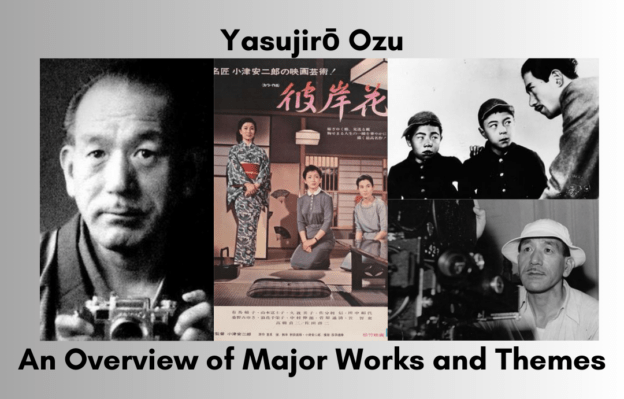An overview of the major works/films by Yasujirō Ozu and the themes he commonly adopted.
Major Works:
- “Late Spring” (1949) – A story about a daughter reluctant to marry, because she doesn’t want to leave her widowed father alone.
- “Tokyo Story” (1953) – A film about an elderly couple who visit their grown children in Tokyo, only to find that their children have no time for them.
- “Early Summer” (1951) – Centers around a family trying to marry off their 28-year-old daughter, who has ideas of her own.
- “Equinox Flower” (1958) – Ozu’s first color film that tells the story of a father and his resistance to his daughter’s wish to marry a man he disapproves of.
- “Floating Weeds” (1959) – About a travelling theatre troupe and the complications that arise when the leader meets his former lover and their son.
- “An Autumn Afternoon” (1962) – Ozu’s final film, about an aging widower who realizes he needs to marry off his only daughter, though he worries about being left alone.
Central Themes:
- Generational Conflict: Ozu frequently explored the tensions between older and younger generations, often set against the backdrop of a rapidly modernizing Japan. This is evident in films like “Late Spring” and “Tokyo Story,” where the gap between parents and their children is palpable.
- Transition and Change: Ozu’s films often meditate on the impermanence of life, with seasons often symbolizing the passing of time and the inevitability of change, as seen in “An Autumn Afternoon” and “Early Summer.”
- The Everyday and the Mundane: Instead of dramatic twists, Ozu fixated on the subtleties of daily life, capturing quiet moments, routines, and domestic spaces to draw out deeper emotional truths.
- Family Dynamics: The family unit is central in Ozu’s films. Whether it’s the bond between parent and child in “Late Spring” or the complexities of marital and sibling relationships in “Tokyo Story,” Ozu delves deep into the intricate web of familial ties.
- Modernization vs. Tradition: As Japan underwent rapid modernization in the post-war era, Ozu’s films often juxtaposed traditional values against the encroachments of modern life, reflecting the societal tension of the era.
- Loneliness and Alienation: Many of Ozu’s characters grapple with feelings of isolation or alienation, often as a result of societal changes or personal decisions. This theme is poignantly illustrated in the quiet suffering of the elderly parents in “Tokyo Story.”
In essence, Yasujirō Ozu’s filmography stands as a gentle yet profound reflection on the human condition, set against the backdrop of 20th-century Japan’s societal transformations. Through his unique cinematic lens, he captured the beauty, sadness, and joy of everyday life, leaving behind a timeless legacy.
